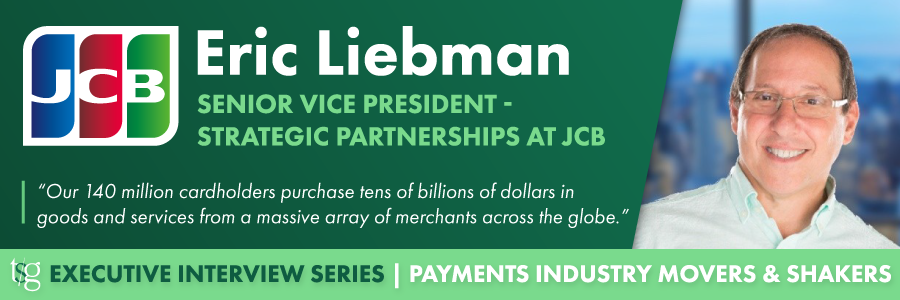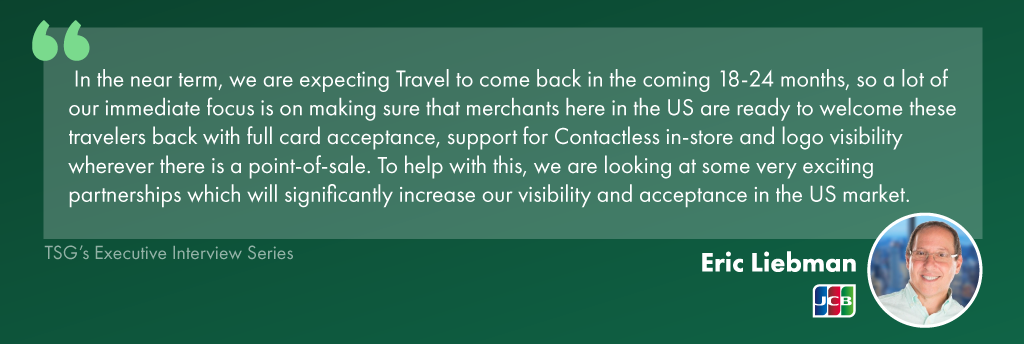
The Executive Interview Series provides readers with exclusive insights from movers and shakers in the payments industry. The Payments Industry is under continuous transformation, as such this series provides diverse perspectives on everything from strategy to payments technology and to the future of the industry.
In this interview, TSG’s Market Intelligence team-member Alex Ferguson sat down with Eric Liebman, Senior Vice President – Strategic Partnerships at JCB to learn more about his journey through the payments industry and how JCB is making a splash in 2022 and beyond.
Background: Eric has built up more than 25 years of experience throughout the USA, Caribbean, Europe, and Asia Pacific, holding a number of senior management roles in Payment Processing, Distribution, Guest Loyalty, CRM, Technology, Sales & Marketing and Operations with a wide range of global businesses and Travel-related companies. Always focusing on the customer as the center of any initiative, Eric has devised, implemented, and managed highly successful programs for Hotels, Airlines, and travel companies across the globe
Q. TSG’s Alex Ferguson:
Looking into your background, you’ve held numerous roles with a focus on the travel and hospitality industries. How did you find yourself drawn to these industries?
Eric Liebman:
I grew up in the Northeast and my dad was not a traveler. Other than summers in our Lake house, we didn’t go anywhere. So, I used to fantasize about traveling to far-away places that I would read about or see in movies. It was fixating. The whole concept of getting on a plane and going to a different location, staying in a hotel, and seeing new places seemed both exotic and exciting! So, from a very early age I decided I wanted to be a part of the Travel industry and set my goals to get there. Since I also had an obsession with aviation, I enrolled in the prestigious Embry-Riddle Aeronautical University in Florida, got my degree in Aeronautics, learned to fly, and worked for the airlines as my first foray into the working world. We had free flights anywhere in the world, so it wasn’t long before I had traveled to nearly all parts of the globe. That eventually led to my setting my sights on actually living overseas, which I fulfilled when I moved my career to the hotel industry and secured roles in the Caribbean, Europe, and Asia. I went on to spend more than 20 years in the Asia region working exclusively in the Travel industry.
Q. TSG’s Alex Ferguson:
In addition to the travel and hospitality focus of your experience, many of these roles were in countries such as the U.K., Japan, and Singapore. What was something you took away from your experiences internationally that has aided you throughout your career?
Eric Liebman:
Living abroad is quite simply the best education anyone can have. Residing amongst people where I was often a rare anomaly in the crowds, I learned to be humble and to be sensitive to other cultures and customs in order to fit in both socially and professionally. It was an incredible experience. I also realized that while there are many traits that makes us all different, there are equally as many attributes that makes us all the same. Embracing those similarities and differences while immersing myself in the people and local cultures was key to truly enjoying my time abroad and gave me the ability to view people in their own light as part of the global community rather than through a lens of “us” and “them”.
Q. TSG’s Alex Ferguson:
How did you get your start in the payments industry?
Eric Liebman:
I spent many years in the consulting world with the likes of IBM and IQ Asia in Singapore. Among the many projects we did, were several payment interfaces for major airlines. So, I cut my teeth on payments with those projects. When I got back to the USA, I was approached by Elavon for a VP role to head up their Hospitality Strategy. It was exciting to be focused on a different part of the industry, and I was able to immerse myself in the Payments world and learned quickly where the big value opportunities existed. After a short time, I realized that Payments was almost an art, and that many travel suppliers didn’t have a defined strategy for Payments, so they were essentially asking their customers to adapt to their payment methods and not the other way around. I quickly became the champion of creating a customer-centric payment strategy for every Travel customer we worked with, which I’ve carried on through all subsequent roles in Payments.
Q. TSG’s Alex Ferguson:
Looking back at all of these experiences we’ve touched on, what do you feel is your biggest contribution to the payments industry thus far?
Eric Liebman:
I have worked on a variety of game-changing products throughout the years, such as piloting a pay-by-link product while heading up Product Strategy with Elavon or rolling out a Payment Orchestration platform as the Global Head of Travel at Ingenico, but I think my greatest contribution to the payments industry is my evangelizing the doctrine of the need for businesses to have a global, customer-centric payment strategy and stop thinking of payments as a finance-driven, transactional thing. We all need to be sensitive to the fact that people around the world may have different buying behaviors and different payment methods, so telling your customer that you respect their particular needs is just the right way to do business. Nothing says you appreciate your customer more than displaying your prices in their currency and accepting their preferred method of payment.
Q. TSG’s Alex Ferguson:
Overall, a lot of people know JCB as a Japanese card brand but are unaware of what other components make JCB unique. Tell us more about JCB and their other activities in the space.
Eric Liebman:
First off, JCB is really more than just a “Japanese” card. We have more than 140 million cardholders from 19 different countries in Asia! They spend vociferously on things like Travel, Retail, Education, Digital downloads and more. JCB is offered in both debit and credit, and we have a large host of co-branded affinity cards helping our customers earn points and get special offers from their favorite loyalty programs.JCB cardmembers receive preferential treatment worldwide such as travel discounts and airport lounge services. They can access unique offers and promotions throughout the world such as shopping discounts and complimentary services. For example, JCB cardmembers can ride the Hawaii Waikiki Trolly for free when they visit Honolulu. JCB cardmembers can receive travel support service at JCB Plaza counters with free Wi-Fi and 24/7 concierge telephone service. When JCB cardmembers from Asia are visiting Japan, JCB offers a variety of services and promotions in Japan including Global Wi-Fi, Lounge service in Tokyo and Kyoto and Japan Guide Mobile App.

Q. TSG’s Alex Ferguson:
What are you primarily focused on in your role at JCB?
Eric Liebman:
I work with my team to try and replicate the domestic buying experience of a JCB Cardholder no matter where in the world they shop. That means not only ensuring acceptance of the card as a start, but also helping to make sure the JCB logo is prominently displayed, and that multi-currency is offered wherever possible. To do this, we work closely with the many ecosystem partners who can help make that happen. From the acquirers to the hardware manufacturers to the POS and technology players – and even the merchants themselves. It’s vital that we have support from each of them to ensure that JCB is properly accepted in all forms; in-store dip and contactless, on the web, in-App and wallet. On the flip-side, we help our partners create promotions aimed at our cardholders to help increase business to them through promotions and special offers.
Q. TSG’s Alex Ferguson:
What are the most difficult hurdles you encounter when working to establish strategic partnerships?
Eric Liebman:
There are some common misconceptions that can create challenges for us. One of them is the perception that we are only a card for Japanese customers. In fact, we have cardholders throughout Asia, who are all buyers of goods globally. Another is when our partners or merchants tell us that they don’t have customers from Japan (again, only one segment of our customer base) and therefore don’t see the need to accept the JCB card. In fact, our 140 million cardholders purchase tens of billions of dollars in goods and services from a massive array of merchants across the globe, but they generally don’t shop with companies who don’t visibly accept the JCB card. So, if you want to have customers from Asia, then make sure you accept the JCB card and prominently display the logo to let our cardholders know you do.
Q. TSG’s Alex Ferguson:
Where do you see JCB five years down the line? What are you most excited about going forward?
Eric Liebman:
Our 5 year goal is to build more value for our cardholders, our issuers and our merchants and continue to work with industry, technology and distribution partners to drive towards 100% acceptance in all businesses in the US both in-store and in the digital realm. In the near term, we are expecting Travel to come back in the coming 18-24 months, so a lot of our immediate focus is on making sure that merchants here in the US are ready to welcome these travelers back with full card acceptance, support for Contactless in-store and logo visibility wherever there is a point-of-sale. To help with this, we are looking at some very exciting partnerships which will significantly increase our visibility and acceptance in the US market.